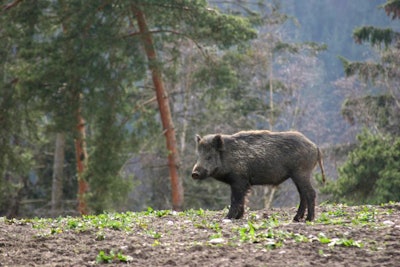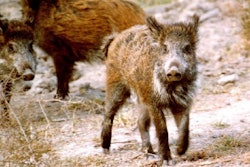
In Germany, fears of the war in Ukraine exacerbating the African swine fever situation are being balanced against the economic implications of the disease on pig production.
African swine fever (ASF) infections in Germany’s wild boar population continue to be confined to three eastern states.
In Brandenburg, Saxony and Mecklenburg-West Pomerania, 3,629 wild boar have so far tested positive for the ASF virus. This is since September 2020, when the country’s first case was detected as the infection spread over the border from Poland.
This total comprises 2,489 in Brandenburg (as of March 25), 1,123 in Saxony (as of March 28), and 17 in Mecklenburg-West Pomerania.
Call for measures to ease ASF impacts in Germany
In Germany, ASF has been found predominantly in the wild boar population, and only in these three states. So far, domestic pigs on just four farms have so far tested positive for the ASF virus.
Until now, the cost of disease control measures that restrict the movement of wild boar have been borne by the three states alone. To reduce the risk of these animals spreading the infection, state authorities have arranged for the construction of double fencing along key areas of the Polish border. Furthermore, incentives have been paid to hunters for wild boar shot or their carcasses reported in areas between the fences.
Last week, the agriculture ministry for Mecklenburg-West Pomerania announced a change to the payment scheme in the state. Effective April 1 until the end of March 2023, hunters may only claim expenses of EUR25 (US$27.60) for each wild boar shot in a restricted area. This flat-rate fee applies for each wild boar shot of any age that tests positive for the ASF virus, and is reported to the veterinary authority.
Subsequently, minister Dr. Till Backhaus explained that agreement had been reached over the sharing of the costs of erecting the wild boar control fencing. Expenses for construction up to the end of December 2020 will be borne by all German states. The total sum of EUR4 million will be shared out according to their pig populations.
Furthermore, the minister reiterated calls on the federal government to support the nation’s pig producers. Among the measures called for are intensified negotiations with China and other trading partners to recognize the concept of regionalization. This would help to restore Germany’s pork exports.
In addition, the sector has called for more assistance to manage the effects of the war in Ukraine. In particular, pig producers are already struggling to cover the rising costs of feed, and they fear that the conflict will exacerbate the ASF situation.
Overview of ASF situation in wild boar in Europe
So far this year, 2,693 outbreaks among wild boar have occurred in Europe. This is according to the Animal Disease Information Notification System operated by the European Commission (EC) in its latest update dated March 26. This represents an increase of 375 from the previous edition on March 11.
So far this year, one or more outbreaks have now been registered through this system by 13 countries.
Recording the most outbreaks has been Poland (888), followed by Germany (546), Romania (245), Bulgaria (225), Romania (220), and Slovakia (206). Also registering new cases through this system over the 15 days were Hungary, Italy, Latvia, and Lithuania.
During the whole of 2021, 12 countries registered one or more ASF outbreaks in wild boar — a total of 12,150 outbreaks.
Latest outbreaks in Italy, North Macedonia, Poland
In early January, ASF was detected for the first time on the mainland of Italy. Since then, the veterinary authority has officially registered 80 cases of the disease in the wild population. These include 13 new cases, according to recent official notifications to the World Organisation for Animal Health (OIE). All cases in the country so far have been in wild boar in the northwest — in Alessandria in the region of Piedmont (Piemonte), and the province of Genoa in Liguria.
During March, North Macedonia reported its first cases of ASF in wild boar to the OIE. In December, the Republic registered its first ever cases of the disease in a backyard pig herd in Delcevo. Five latest cases in the wild population were found in the same municipality in the east of the country, which borders Bulgaria.
Over recent weeks, 102 ASF outbreaks involving a total of 184 wild boar have been confirmed in Poland. According to the national chief veterinary office, these cases were suspected in the period February 25 to March 21. So far this year, the agency has recorded 809 outbreaks in this population.
Meanwhile, 1,161 further Polish ASF cases have been registered over the past two weeks with the OIE. These appear to be reported retrospectively from the end of 2021.
ASF situation in wild boar in Russia, Ukraine
According to the latest report to the OIE from the Ukrainian veterinary authority, ASF has been “resolved” in the Kyiv area.
Following an absence of around six months, ASF was detected again in this region in early February. At one location, two wild boar tested positive for the virus.
EC does not monitor the ASF situation in Russia. However, since March 21, OIE has been notified by Russia’s animal health agency that the disease situation is closed in North Ossetia-Alania. In this Republic in the North Caucasus federal district, no further cases have been reported since four wild boar were found at one location in January.
After a four-month hiatus, ASF has been detected again in the region of Oryol (Orlovskaya). One wild boar was found dead in late March in this region of the Central federal district.
Elsewhere in Russia, further cases among the wild population have been detected in Rostov and Volgograd in the Southern federal district, as well as in the Volga federal district region of Saratov.
Romania, Serbia report ASF outbreaks in domestic pigs
As of March 26, eight European nations had officially confirmed with the EC one or more ASF outbreaks among domestic swine so far this year.
By that date, the region’s outbreaks in these animals had reached 131 so far this year. Of this total, 86% were reported in Romania, followed by Serbia where 11 outbreaks in swine have been recorded.
Latest official OIE notifications from Romania outline eight new recent outbreaks, all in backyard herds, and each with no more than eight pigs.
Further details on the ASF situation in Serbia are provided by a recent official notification to the OIE. Covering the period December 2020 to the same month last year, this report outlines a total of 114 outbreaks in domestic pigs. Directly impacted were a total of around 19,700 animals from 109 non-commercial premises. Of the five farms registering an outbreak over this period, one had 18,600 pigs.
These most recently reported outbreaks bring Serbia’s outbreaks to 371 since January of 2020. This total includes outbreaks involving 369 wild boar, and almost 20,000 domestic pigs.
View our continuing coverage of the global African swine fever situation.

















